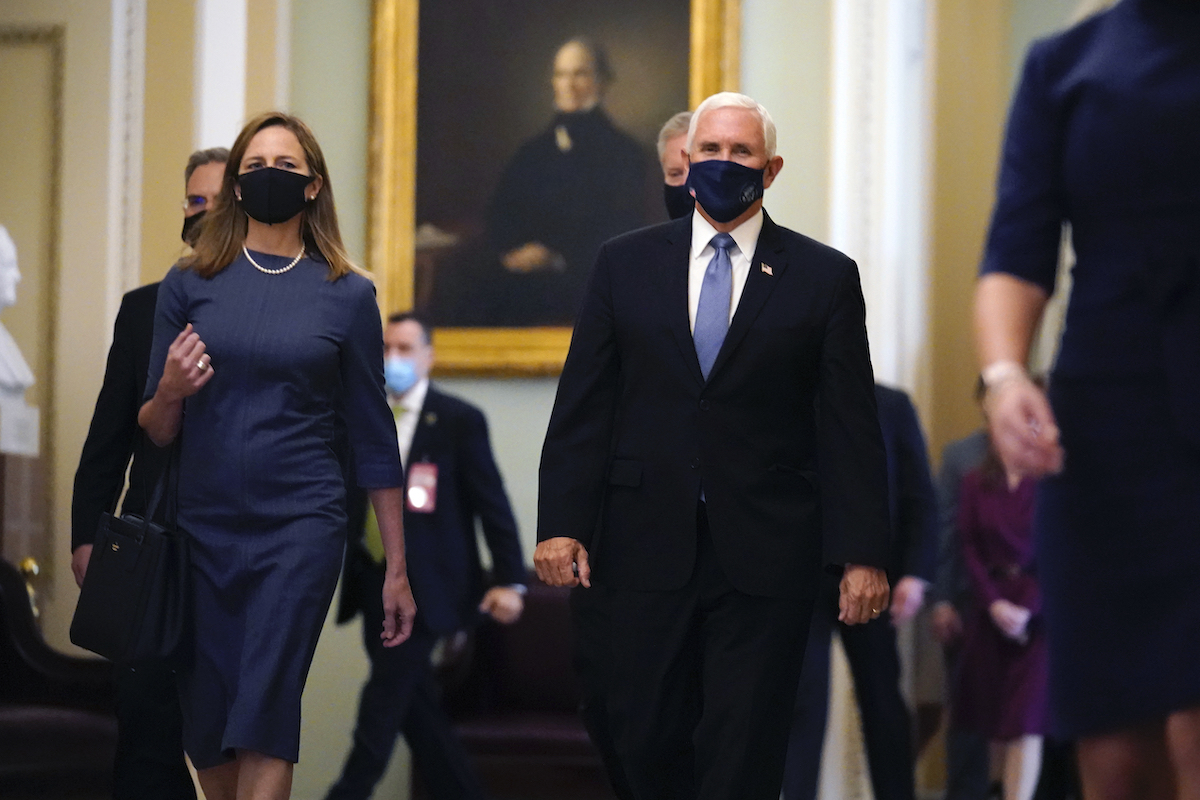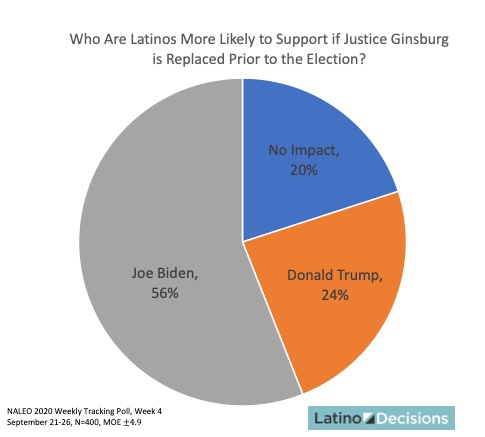

Judge Amy Coney Barrett, President Donald Trump’s nominee for the U.S. Supreme Court, is escorted to the Senate by Vice President Mike Pence where she will begin a series of meetings to prepare for her confirmation hearing, at the Capitol in Washington, Tuesday, September 29, 2020. (AP Photo/J. Scott Applewhite)
By Adrian Pantoja
The death of Ruth Bader Ginsburg and Trump’s selection of conservative replacement Amy Coney Barrett has left Democrats in a state of shock. Although a majority of Americans say that the appointment of a new Supreme Court justice should be delayed until after the election, Trump and Republicans in the Senate are rushing to fill the vacancy. This could help Biden motivate his supporters and it may provide Democrats with an opportunity to mobilize Latino voters.
The stakes in this election are incredibly high for Latinos and the passing of Ruth Bader Ginsburg have raised them even higher. A conservative replacement on the Supreme Court will have an impact on Latinos for decades to come. Thomas A. Saenz, president and general counsel to the Mexican American Legal Defense and Educational Fund, has noted that “the size and prominence of the Latino nationwide is reflected in the Supreme Court docket of the last ten years. More and more cases before the Court will enter on the legal issues faced by the Latino community.” Given the potential consequences, how do Latinos feel about the Republicans’ decision to move forward with a nomination and appointment before the election?


In our survey, 67 percent of Latinos agreed with the statement, “The Senate should wait until after the election and let the next president make the nomination.” That sentiment was highest among Democrats (86%), likely voters (74%), and women (71%). Latinos were also asked if they would be more likely to support one of the presidential candidates if the Senate confirms the Supreme Court nomination. Over half of respondents (56%) said it would boost their support for Biden and women (58%) were among those respondents most likely to be activated by this decision.
It has been noted that Biden’s selection of Kamala Harris was driven in part by the desire to mobilize Black voters broadly and women in particular. A number of commentators have highlighted the power of African American women in shaping the 2020 election. Indeed, a popular trope about why Democrats were victorious in 2008 and 2012 and not in 2016 is tied to the rise and fall of black voter turnout, with Black women being a pivotal force. Like Black women, Latinas have the power to mobilize their families and the wider community. In fact, Latinas are the second largest and second fastest growing group of women of color voters in the country. Political parties ignore the potential of Latinas at their own peril.
In week four of our tracking poll, 13 percent of Latinas reported that they are undecided about who they will vote for in the 2020 presidential election. Could the push by Trump and the Republicans to fill Justice Ginsburg’s seat on the Supreme Court sway undecided Latinas to vote for Joe Biden? If the Democrats draw on Obama’s strategy of leaving nothing to chance, they will use this moment to help secure the vote of undecided Latinas, and in doing so they will likely capture the vote of the wider Latino community.
***
Adrian D. Pantoja is associate dean of faculty and professor of politics at Pitzer College, and Senior Analyst with Latino Decisions.


